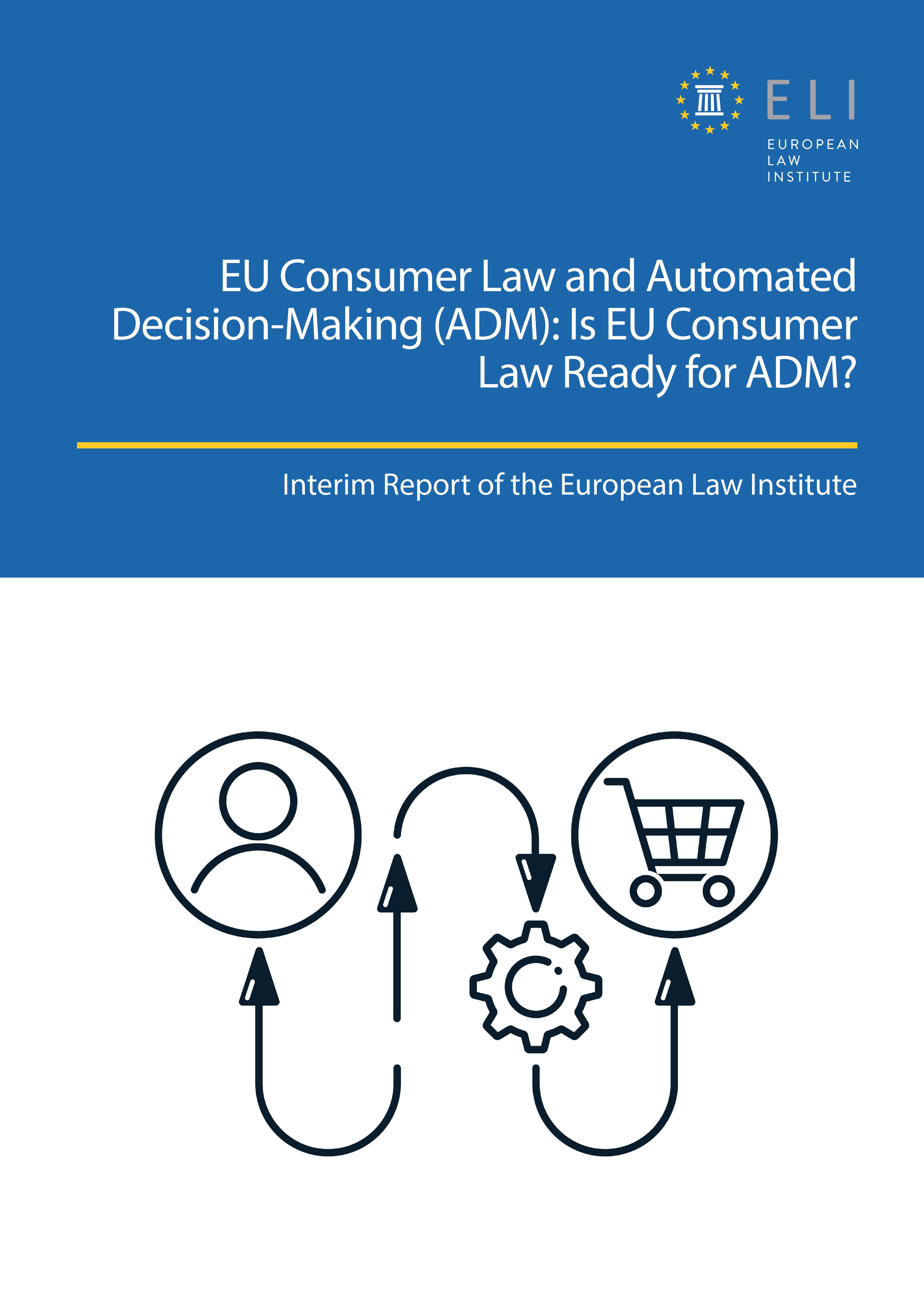ELI Guiding Principles and Model Rules on Algorithmic Contracts
Quick Facts
Project Type: Guiding Principles and Model Rules
Procedure: Regular
Adopted: CD 2022/5
Project Period: March 2022–February 2025
Interim Output: ELI Interim Report on EU Consumer Law and Automated Decision-Making
Events
An overview of past and upcoming events of this project is available here.
Background
A growing use of algorithms and artificial intelligence (AI) is being observed in all phases of the contract lifecycle – from formation to performance – and it has already given rise to significant academic contributions and several court-rulings. In addition, policymakers at national, regional and global level are investigating the potential legal implications of this development.
Providing increased legal certainty for the use of automatic/algorithmic decision-making (ADM) at any stage of the contract lifecycle is vital to support a new generation of digital contracts. The pervasive use of algorithms and AI learning systems in transactional contexts adds urgency about addressing the legal challenges of autonomous systems for automating the contracting process, particularly in AI-dominated scenarios. Fostering innovation and unleashing the social benefits and the economic potential of AI require sound guidance for providers, operators, and market actors with a clear and predictable legal framework. Concurrently, establishing effective safeguards to ensure the protection of consumers, to guarantee the validity and the enforceability of contracts where ADM has been used, and to protect the rights, freedoms, and legitimate interests of all parties involved is instrumental in defining an enabling legal framework for automated and autonomous contracting in Europe.
The project focuses on the use of ADM, and in particular AI-driven learning systems, in the various stages of the contract lifecycle in consumer contracts (B2C and C2B). This approach comprises automated contracting generally, and autonomous contracting specifically.
Aim
The project aims to assess, firstly, the adequacy of the existing EU consumer law for the use of ADM in contracts and, subsequently, identify gaps to fill and the necessary legal steps required to facilitate autonomous contracting in B2C and C2B transactions.
Outcome
The project will be conducted in two stages. The first phase was completed in December 2023 with the publication of the ELI Interim Report on EU Consumer Law and Automated Decision-Making, available here. The Interim Report provides eight general principles that should guide the adaptation of existing EU consumer law to ADM. It also reviews the ADM-readiness of key EU consumer law directives for the conclusion of contracts through the use of AI by consumers and/or traders, with recommendations for clarifications and additions to improve their ADM-readiness.
In the second phase, the Project Team will focus on the formulation of Guiding Principles and Model Rules for the use of ADM in Consumer Contracts. Although the focus will primarily be on consumer contracts, some of the guiding principles and model rules might also be suitable for other contracting constellations. The above Interim Report will be further revised in light of the findings in phase II.
Project Reporters
- Christoph Busch
- Marie Jull Sørensen
- Teresa Rodríguez de las Heras Ballell
- Dariusz Szostek (until October 2023)
- Christian Twigg-Flesner
Project Team Members
- Andrea Bertolini
- Anne de Vries-Stotijn (until June 2024)
- Mateusz Grochowski
- Monika Jagielska
- Vanessa Mak
- Damjan Možina
- Rania Wazir
Advisory Committee Members
- Başak Başoğlu (Assessor)
- Peter Istrup (until June 2023)
- Pierpaolo Gori
- Irene Kull
- Jesper Løffler Nielsen
- Daniella Lupini
- Gilberto Nava
- Pascal Pichonnaz (Assessor)
- Christina Ramberg
- Marc Rotenberg
- Marta Santos Silva (Assessor)
- Minesh Tanna
Members Consultative Committee
- Marta Santos Silva (MCC Chair)
- Cristina Argelich-Comelles
- Alessio Azzutti
- Arvind Babajee
- Hugh Beale
- Luca Boggio
- Pınar Çağlayan Aksoy
- Tomasz Chmielewski
- Boyan Dachev
- Department of Business Law at the University of Zagreb Faculty of Economics & Business (represented by Ivan Tot)
- David Dolidze
- Rossana Ducato
- Mateja Durovic
- Mustafa Ebaid
- Sjef van Erp
- Andrea Fejős
- Laura Maria Franciosi
- Tomás Gabriel García Micó
- Kadir Berk Kapancı
- Habbine Estelle Kim
- Florencia Marotta-Wurgler
- Sónia Moreira
- Ali Osman Ozdilek
- Ekin Ömeroglu
- Marlena Pecyna
- Paola Rodas Paredes
- Vyara Savova
- Renate Schaub
- Sebastian Schwamberger
- Carlo Serrano
- Ludovica Sposini
- Antonio-Catalin Teodorescu
- Eric Tjong Tjin Tai
- University of Georgia (represented by Nata Sturua)
- Yanko Xavier
- Christopher Wray
- Sara Adami-Johnson
- Melvin Tjon Akon
- Vladimir Palamarciuc
- David Messner-Kreuzbauer
- Benedetta Sirgiovanni
Observers
- European Commission (represented by Maria Peltoniemi)
- The International Institute for the Unification of Private Law, UNIDROIT (represented by Anna Veneziano)
- The United Nations Commission on International Trade Law, UNCITRAL (represented by Alexander Kunzelmann and Corentin Basle)
- The European Consumer Organisation, BEUC (represented by Kasper Drazewski)
- EuroCommerce (represented by Ilya Bruggeman)
- Federation of E-Commerce and Distance Selling, FEVAD (represented by Marc Lolivier)

